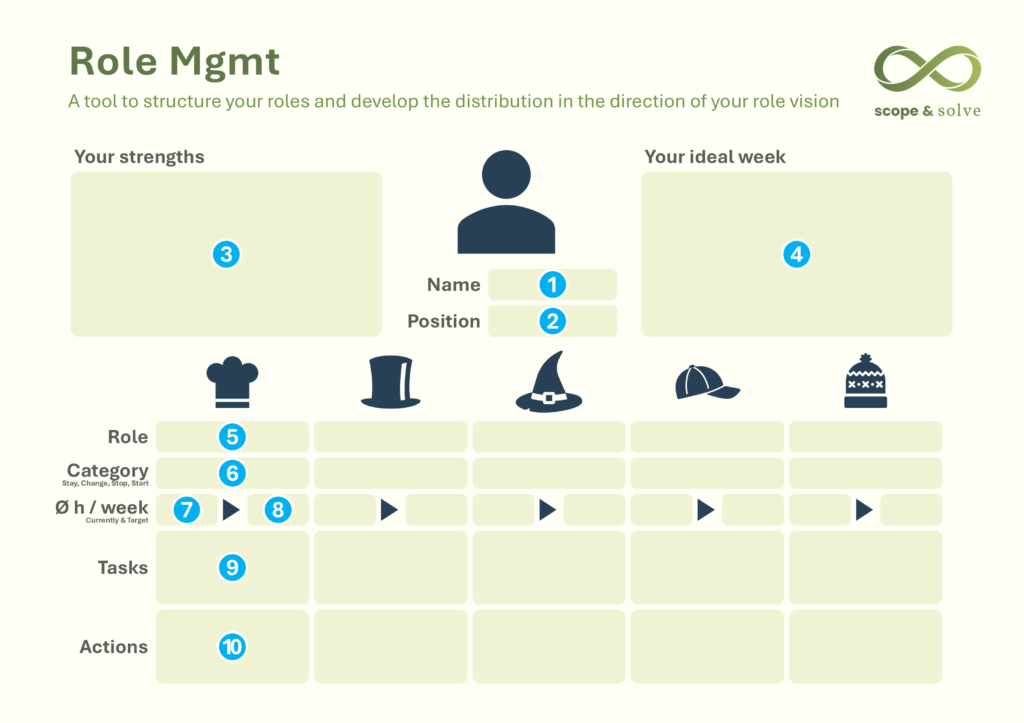Top 3 Key Facts
- “Delegating/handing over tasks” doesn’t work, but there is a viable alternative.
- Sales leaders face enormous challenges letting go of operational daily activities (i.e., personally managing customers).
- Role management isn’t rocket science, but it can be challenging to implement. That’s why we provide you with our Role Management Poster.
Use case explanation
Sales Directors or sales team leaders are responsible for guiding the operational sales team. Depending on the process, the team consists of field sales, internal sales, marketing, and sometimes technology departments that support offer creation and trials. Often, these leaders were previously successful salespeople themselves and therefore know the operational processes very well. Their promotion to a leadership role creates a natural prioritization conflict because it’s difficult to let go of “operational daily activities.” Frequently, Sales Directors/team leaders still have their own customers who need attention, support sales colleagues with their customers, make customer visits, participate in negotiations, and simultaneously handle all leadership responsibilities, which include reporting, planning, and exchanges with management from other departments (production, purchasing, innovation, executive management, etc.). Many of our clients in this position continuously increase their weekly working hours until vacations become shorter and physical stress limits are reached. Well-meant advice like “Just delegate more. You need to learn to delegate better” doesn’t work because it results in poor quality outcomes and actually creates more work. Things need to be redone.
A better solution is to question the underlying belief that drives these behaviors. The belief is: “If I work more, I’ll achieve/accomplish more. To do justice to my position, I must work this much.”
However, this belief has nothing to do with reality; it’s just the perceived reality of the leader, for which they receive new evidence every day.
The new belief with which we replace the old one could look like this: ” If I move more slowly and spend time proactively, we’ll advance faster as a team.” At first, this might sound counterintuitive.
The majority of many leaders’ days consists of ” firefighting”: constantly dealing with urgent problems and emergencies as they arise, instead of focusing on strategic planning or long-term solutions. However, There is always an underlying cause for every firefighting situation:
- The customer is dissatisfied because Process XY failed to meet their requirements.
- Sales Manager XY isn’t familiar with the applications, so the leader must step in.
- Product management got involved late, causing training material delays, so the leader must play catch-up.
- The international team made offers without prior approval from Germany, leading to a rushed review.
- The managing director noticed that the submission deadline for the board meeting is next week, resulting in an urgent need for the necessary figures.
- …
By actively creating room in their schedule, leaders can address the root causes of these issues and work to eliminate them long-term. The more time they spend in this proactive role, the fewer firefighting incidents arise. Therefore, the leader takes on an additional role—the “proactive role model”—which necessitates giving up other roles.
We use a one-pager, often in the form of a physical A1 poster. The poster helps the leader become aware of their roles, imagine an ideal week, and systematically pass on roles until they achieve a manageable workload, ideally focused on what should and must be done. And yes, this also works in an international corporation.
If you’d like the poster as a print-ready template, please send me an email (sebastian@scopeandsolve.com).

- What’s your name?
- What position/title do you hold?
- What are your current strengths? Technical? Methodological? Interpersonal? Values? Behaviors? Positive beliefs?
- How do you envision your ideal week? How much time will you spend in meetings? How much with customers? How much time is for learning new skills? How will you work with your team? How much time will you spend with your family? How much for sports?
- Based on your ideal week: What do we do with each role? Start it because you aren’t doing it now? Stop it because it doesn’t fit into the ideal week? Keep it but modify it? Simply keep it?
- Time Tracking: If you track your time accurately (like I do), you can analyze how much time you spend on each role weekly. If not, analyze your calendar from the past four weeks and assign each appointment to a role, adding estimates for “non-appointments” (calls, tasks, etc.). Look at the result. How much are you working per week?
- Ideal Work Hours: How much do you want to work per week in your ideal week? How much time will each role take in your ideal week?
- Role Definition: What tasks/responsibilities define each role? (e.g., conducting employee meetings, visiting customers, preparing data, etc.)
- Action Steps: What actions will you take to get closer to your ideal week?
Why so important
Proactive role management, especially for operational leaders, is crucial because giving up operational roles is complicated by existing customer relationships and because the operational role is naturally comfortable—it’s what the leader excels at. The challenge is that pressure from senior management will only increase, and without a functioning team, targets cannot be met.
Discussing roles directly confronts leaders with the questions: “What am I good at?” “What is my actual role?” and “What do I need to let go of to fulfill that role?”—difficult and initially uncomfortable questions. To avoid mid-term consequences like private relationship conflicts from heavy workloads or even burnout risk, it’s advisable to start reflecting on one’s roles early on.
Benefits
- More time for proactive topics, projects, and contingencies.
- Less time spent firefighting and attending meetings.
- A continuously better-functioning team.
- A more relaxed team atmosphere. (“When the leader is relaxed, so is the team”)
Conundrum
What makes this use case so difficult and challenging? Can you, as an operational leader, accept that working more will NOT lead to more or better results? Are you willing to try the belief: “If I spend more time proactively and move slower, we’ll advance faster as a team” for at least six months?
Action steps
- Send me an email to receive the print-ready poster template.
- Print the poster on A1-sized paper and get small Post-Its (51x38mm).
- Block off four hours without meetings or distractions. (Tip: Write “Meeting with Sebastian” in your calendar to avoid scheduling conflicts.)
- Fill out the poster initially.
- Set a monthly meeting (ideally for a whole day! I know how hard that is initially) to reflect and adjust your poster (use Post-Its instead of writing directly on the poster).
Our take-aways
- One critical takeaway is that the well-meant advice “You need to delegate better and hand over more tasks” simply doesn’t work effectively. It fails because it doesn’t address the underlying belief. Even if someone executes the action “delegate more” without challenging the belief “If I work more, I achieve more. To do my job properly, I must work this much,” the result will likely worsen. This is a self-fulfilling prophecy: the leader hands over tasks, expects it not to work, and because “tasks” rather than “roles” are delegated, it doesn’t work. The leader’s belief is confirmed yet again that delegation doesn’t work, and they’re better off doing everything themselves.
- Role management takes time; roles cannot just stop overnight. To pass on a role sustainably, others need to be trained in that role. That takes time. Disappointment comes from unrealistic expectations, so I’ll tell you directly: plan for at least six months before feeling the real effects.
- Role Sparring: Find a colleague, boss, someone from HR, an external coach, or someone else who can help you spar through this process and remind you during moments of weakness.


